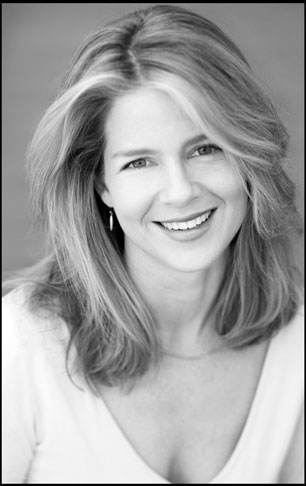
introducing readers to writers since 1995
August 12, 2005
Author2Author: Adrienne Brodeur &
Amanda Filipacchi, pt. 4
by Ron Hogan
Thanks again to Adrienne and Amanda for joining us this week. Be sure to come back next week, when Author2Author takes on Nancy Drew as Susan Kandel and Chelsea Cain settle in for a week-long conversation.
 Adrienne Brodeur: When I first read Love Creeps' flap copy, I had my doubts that I could get lost in the fictional universe of a "triangle of stalkers." It seemed as if it might be contrived or too much of a fictional leap for me to make, but I was happily hooked within a very few pages and never looked back. This makes me wonder which came first: the chicken (in this case, the characters) or the egg (the concept). When you started writing, did you have eccentric, stalking characters in search of a plot? Or did you have a concept (stalking and obsession) and develop characters to explore it?
Adrienne Brodeur: When I first read Love Creeps' flap copy, I had my doubts that I could get lost in the fictional universe of a "triangle of stalkers." It seemed as if it might be contrived or too much of a fictional leap for me to make, but I was happily hooked within a very few pages and never looked back. This makes me wonder which came first: the chicken (in this case, the characters) or the egg (the concept). When you started writing, did you have eccentric, stalking characters in search of a plot? Or did you have a concept (stalking and obsession) and develop characters to explore it?
Amanda Filipacchi: All three of my novels deal with obsessive love in one form or another, so that's a theme I keep coming back to. But at the same time I always try to create characters and plots that strike me as completely original, completely new, the kinds of people and situations I've never seen before in books or movies. In the case of Love Creeps, the idea of a stalking triangle really intrigued me and I thought I could write a novel that would tackle the topic in an original and entertaining way. I hope I've succeeded. And I hope the flap copy doesn't put people off! I know that probably most readers are interested in topics or characters they can identify with, but even I sometimes don't identify with my characters--at least at first.
I've noticed that my life frequently imitates my writing. After working on a novel and on characters for a long time, and thinking about them a lot, I begin to understand the characters better and even to identify with them more than I did at first. I become influenced by them, to a certain extent. Sometimes I even start experiencing what they experience. For example, in Love Creeps I wrote about a woman who lost her desire for everything in life. I had never experienced such a thing, never knew anyone who had, and didn't even really believe that such a thing was entirely possible. I was simply interested in the concept. After a couple of years of working on that book, I started experiencing that very problem. It's actually a symptom of depression, and I'd always tended to be a bit prone to depression, but never with that particular symptom. It's as though that character's problem rubbed off on me. By putting myself in her shoes and trying to imagine what it must feel like to lose one's desire, I eventually grasped that knowledge all too well.
That experience and others like it has led me to conclude that I should perhaps be careful what I write about. I decided that for my next novel I should try writing about happy people in fortunate circumstances. It's a challenging enterprise, because most stories are based on conflicts and problems and negative elements that need to be overcome. I asked the film director, Neil LaBute--who wrote the screenplay adaptation of my second novel, Vapor, and is meant to direct it--what he thought of my idea of only writing about happy characters in good circumstances, telling him I thought it might have a positive influence on my life and happiness. I asked him whether he'd ever consider doing such a thing, and he said something like, "God no." That's not surprising when you think about the wonderfully grim and twisted stories and characters he concocts. And maybe his writing doesn't affect his life as much as mine does. So I embarked on this project of writing a novel with a joyful plot and happy characters, and I'm very pleased with the novel so far, very excited about it--though of course I've failed completely in making my characters happy and limiting their lives to fortunate events. The other day I was flying back from L.A., refining the story in my head, and part of the plot toward the end is so sad it was making me cry on the plane. So I guess that's proof enough I've failed to keep the book 100% joyful, but hopefully not in creating a successful novel.
your PayPal donation
can contribute towards its ongoing publication.